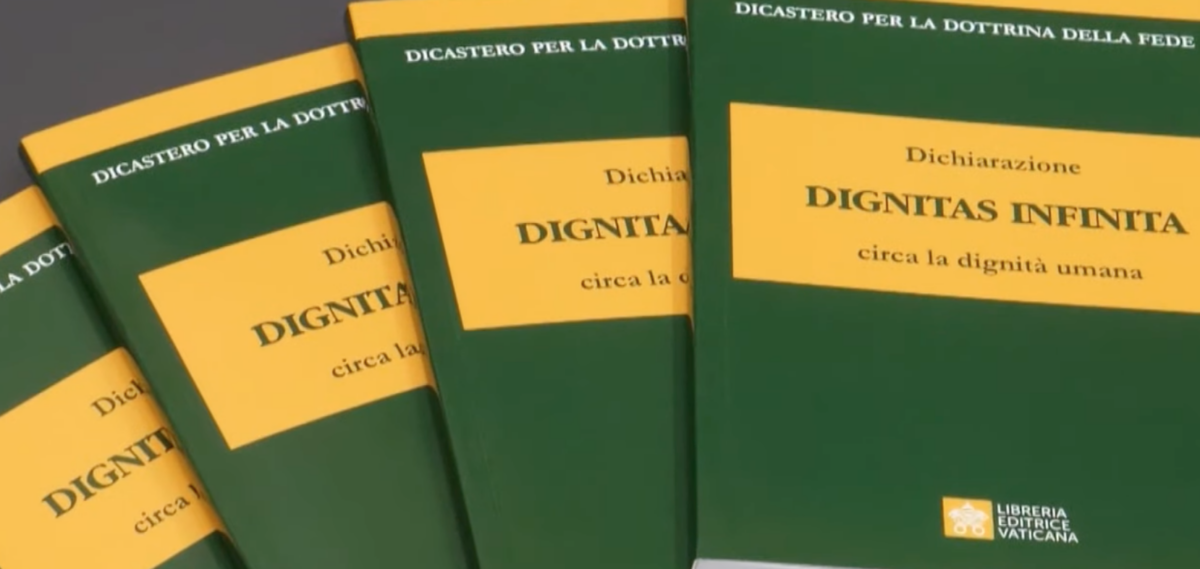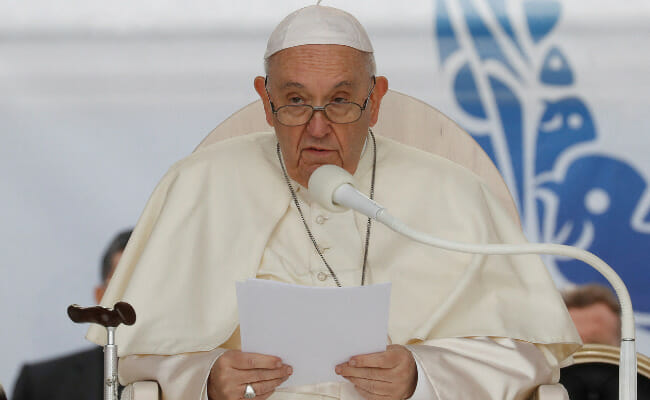Vatican: Sex change, gender theory, surrogacy violate human dignity

Dignitas Infinita is a 2024 declaration on Catholic doctrine that outlines the nature of human dignity. Image: Screencap/EWTN
Through its newest document called Dignitas Infinita, or “Infinite Dignity,” the Catholic Church declares that gender-affirming surgery, or the idea that one’s biological sex can be changed, and surrogacy are grave violations of human dignity, putting them on par with abortion, death penalty and euthanasia, which are acts that it says reject God’s beautiful plan for human life.
Dignitas Infinita is a 2024 declaration on Catholic doctrine that outlines the nature of human dignity, explains man’s relationship with God and condemns modern-day violations of human dignity. As expected, this 20-page declaration received immediate criticism from those who argued against the Church’s position on many of the issues covered.
The Jesuit pontiff’s outreach to the LGBTQ+ community is a hallmark of his pontificate. Yet Pope Francis’ approval of the new document makes it consistent with his thinking that the Church should welcome trans people and accompany them pastorally, but, in his mind, the so-called “gender ideologies” have no place in the Church.
The new document said God created man and woman as biologically different, and people must not tinker with that or try to “make themselves like God.”
Dignitas Infinita—A Synthesis

Pope Francis’ approval of Dignitas Infinita makes it consistent with his thinking that the Church should welcome trans people and accompany them pastorally, but “gender ideologies” have no place in the Church. FILE PHOTO (REUTERS/Todd Korol)
Allow me to present a synthesis of the new document, as requested by some Catholic and non-Catholic friends. The new document follows the method of the Second Vatican Council: A reading of the signs of the times and their interpretation in the light of the Gospel (Gaudium et Spes, 4).
I—SEEING—The signs of the times: Human dignity is under threat.
- POVERTY is “one of the greatest injustices in the contemporary world” (Dignitas Infinita, 36).
- WAR is “another tragedy that denies human dignity” and is always a “defeat of humanity” (38), to the point that “it is very difficult nowadays to invoke the rational criteria elaborated in earlier centuries to speak of the possibility of a just war” (39).
Against life itself, the document mentions the following:
- ABORTION. The condemnation of abortion is strong: “Among all the crimes that can be committed against life, procured abortion has characteristics that make it particularly serious and deplorable,” and reference is made to the fact that “the defense of unborn life is closely linked to the defense of each and every other human right” (47).
- EUTHANASIA AND ASSISTED SUICIDE, confusingly defined by some laws as “death with dignity.” The document stresses that “suffering does not cause the sick to lose their dignity, which is intrinsically and inalienably their own” (51).
- DEATH PENALTY “violates the inalienable dignity of every person, regardless of the circumstances” (34).
Then the acts against the integrity of the human person are presented.
- “TRAVAIL OF MIGRANTS,” whose “lives are put at risk because they no longer have the means to start a family, to work or to feed themselves” (40).
- HUMAN TRAFFICKING—also slavery, prostitution and the selling of women and children—is described as “vile activity, a disgrace to our societies that claim to be civilized” (41).
- SEXUAL ABUSE leaves “deep scars in the hearts of those who suffer it.” These are “sufferings that can last a lifetime and that no repentance can remedy” (43).
- DISCRIMINATION AND VIOLENCE AGAINST WOMEN—coercive abortions, which affect both mother and child, often to satisfy the selfishness of males” and “the practice of polygamy” (45).
- SURROGACY, by means of which “the immensely worthy child becomes a mere object.”
- “THE MARKETING OF HUMAN ORGANS, slave labor, including prostitution, the drug and weapons trade, terrorism and international organized crime” (42).
- SUBHUMAN LIVING CONDITIONS, arbitrary imprisonment, deportation and degrading working conditions where individuals are treated as mere tools for profit rather than free and responsible persons.
- MUTILATION, physical and mental torture, and undue psychological pressures are all offenses against human dignity.
- DIGITAL VIOLENCE. “New forms of violence are spreading through social media,” such as cyberbullying, and “the internet is also a channel for spreading pornography and the exploitation of persons for sexual purposes or through gambling” (61).
Gender Theory is given special attention.
- “Every sign of unjust discrimination” against homosexual persons “is to be carefully avoided, particularly any form of aggression and violence.”
- In some places, “not a few people are “imprisoned, tortured, and even deprived of the good of life solely because of their sexual orientation” (55).
- However, Gender Theory is “extremely dangerous since it cancels differences in its claim to make everyone equal” (56). “Human life in all its dimensions, both physical and spiritual, is a gift from God.”
- “Desiring a personal self-determination, as gender theory prescribes … amounts to a concession to the age-old temptation to make oneself God” (57).
- Gender Theory “intends to deny the greatest possible difference that exists between living beings: Sexual difference” (58). Therefore, “all attempts to obscure reference to the ineliminable sexual difference between man and woman” are “to be rejected” (59).
- SEX CHANGE “risks threatening the unique dignity the person has received from the moment of conception” (60).
II—DISCERNMENT in the light of the Gospel and Christian principles.
The document provides the fundamental principles that cover human dignity.
- IMAGO DEI. “In the light of Revelation, the Church resolutely reiterates and confirms” the “ontological dignity of the human person, created in the image and likeness of God and redeemed in Jesus Christ” (1).
- HUMAN DIGNITY. “Inalienable dignity” is a “gift” and, therefore, present in “an unborn child, an unconscious person, or an older person in distress” (9).
- “The Church proclaims the equal dignity of all people, regardless of their living conditions or qualities” (17).
- PERSONAL DIGNITY” TO “HUMAN DIGNITY.” It is not correct to prefer the expression “personal dignity” to “human dignity.” It is a mistake to understand a person as “one who is capable of reasoning” (24).
- It is wrong to say that “the unborn child would not have personal dignity, nor would the older person who is dependent upon others, nor would an individual with mental disabilities.”
- Au contraire, THE CATHOLIC CHURCH insists that the dignity of every human person, precisely because it is intrinsic, remains in all circumstances” (24), from conception to death, from cradle to the grave.
III—ACTING—Christians are called to action.
- The Declaration ends by urging that “respect for the dignity of the human person beyond all circumstances be placed at the center of the commitment to the common good and at the center of every legal system” (64).
It is my personal conviction that the new document says that it is time for all Christians to stand up and defend the image of God in every human person.
Dr. José Mario Bautista Maximiano is the author of Why Remain a Catholic (St. Paul’s Publication, 1993) and Spiritual Man (St. Paul’s Publication, 1994). Email: jomaximiano@gmail.com.

